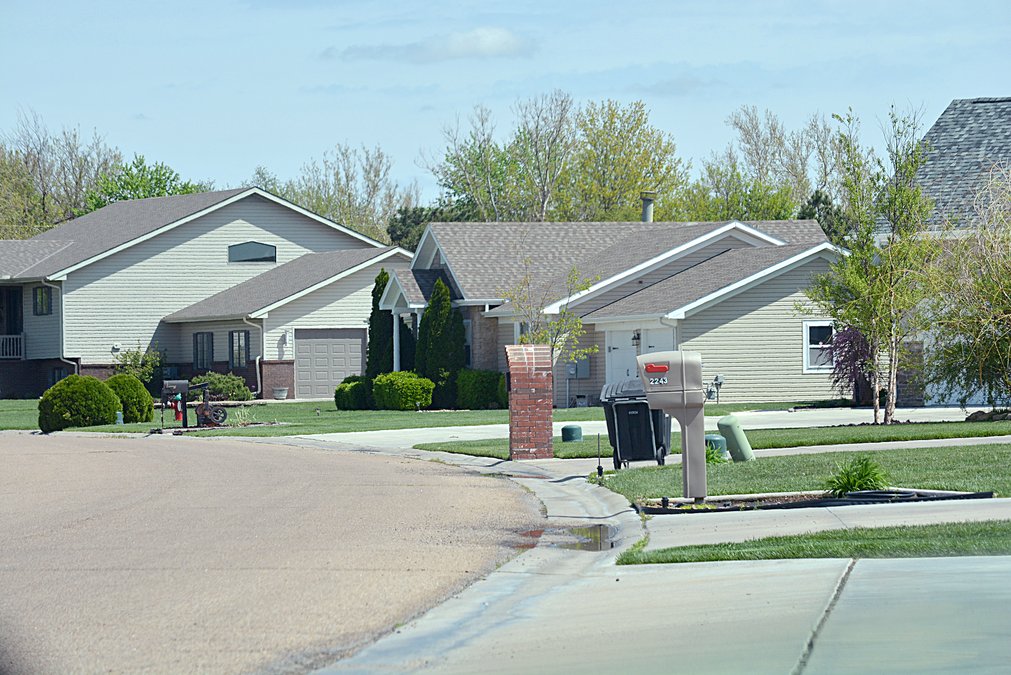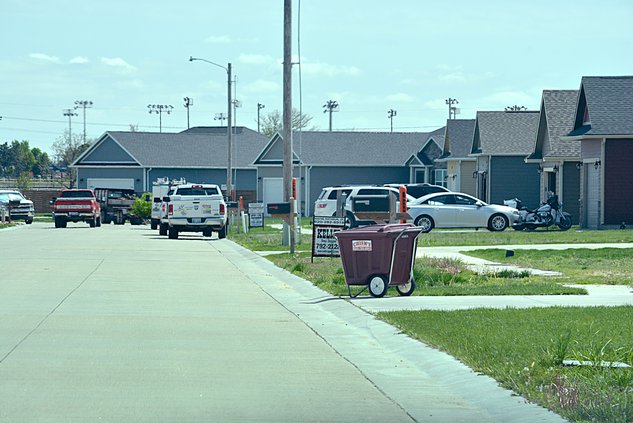To assuage concerns of Amber Meadows residents over basement flooding, the Great Bend City Council Monday night approved a groundwater study to determine possible solutions. But, it took a 90-minute discussion and a mayoral tie-breaking vote to approve the $25,000 project, the cost of which will be assessed to future homeowners in the housing development.
Engineers gave no promises their work would produce an answer. And, even if it does, they warned the cost of mitigating groundwater seepage could be north of six figures.
The governing body weighed the pleadings of residents fearing damage to their homes and drops in property values with the city’s worry that such a study would set a precedent and other neighborhoods would want studies done as well.
Some on the council felt the city had no culpability for the flooding. But, other council members agreed with the residents that the lots in Amber Meadows are city-owned and that the city shares at least some of the responsibility, and were worried that doing nothing would stunt further development there, scaring away potential buyers.
“I don’t think it would be a good investment of city money to do that,” said Councilman Dana Dawson. “The contractors built the floors too low. Great Bend has had this problem forever and they should have known that.”
“I would recommend that we not we move forward with this,” said City Administrator Kendal Francis. “I have empathy for the homeowners and if I was in their spot, I’d be looking for some assistance as well.”
However, “frankly, in my opinion, we don’t control the groundwater tables,” he said. “I don’t think the city has any liability for the work we’ve done.”
And, for the city to remediate in certain areas of the city could cause problems somewhere else, Francis said.
Still, “this isn’t the first time we’ve had issues,” said resident Brett Behrens, whose lived in the western portion of the area for four years. “Where I’m at, that whole area was all developed by the city so we feel, as homeowners, that the city does have a little responsibility to help protect us.”
There could be a number of houses built in that area over the next decade, Behrens said. “I’d just encourage you to look at this as a chance to find out and put a little money back into this area and think about how this area might develop further.”
Brian Staats has had a home at the eastern end of the development for three years and this is the first year he’s had problems with water. “It seems like there’s just a lot of speculation as to what to do.”
The cost of a study would be a small price to pay, he said. “That would help the development of the area knowing we have a solution.”
Although he feels for the residents, “the problem is that we are going to set a precedent that everyone in town is going to want a study done if they get water in their basements,” Dawson said.
A tough call
The city was contacted in recent months by property owners in that northwest Great Bend development regarding continuous water infiltration forcing constant running of basement sump pumps. Most of the issues are on the west end of the subdivision, but there are also concerns elsewhere.
An analysis is needed to determine options which may require infrastructure improvements, said Josh Golka, the city’s on-call engineer with Professional Engineering Consultants of Wichita.
Golka said PEC will bring in SCS Engineers, groundwater specialists out of Wichita, to perform the necessary analysis.
“When there is a wet year, the groundwater table rises,” he said. “Their sump pumps are barely keeping up, a real concern for any property owner.”
The idea is to come up with suggestions and get their minds around the costs associated with those, as well as more information regarding the soil conditions and the groundwater table itself, Golka said.
There are a number of entities involved, he said, including the Big Bend Groundwater Management District Number Five (which covers this area), the Kansas Department of Agriculture, Division of Water Resources, and the Kansas Water Office. The most help will come from the management district.
“They’re going to be tremendous assets in this process in terms of looking at historic data and permitting,” Golka said. But, “they are not in the capacity of doing the study themselves or offering financial assistance.”
Rising water table
Compounding the problem is that the homes were built in drought years. Meanwhile, water conservation measures in the management district have raised the water table.
The aquifer is an “ocean of water” underground, Golka said. The drainage basin for this area covers over 100 miles.
The city has done some earth work in the past and could do some more grading. “But those won’t make any tangible impact to the groundwater table itself,” Golka said.
“We want to come up with real options,” Golka said. This could be some sort of structure, such as a series of well systems that would control the groundwater.
But, “this is the study portion,” he said. “There could be some sticker shock” associated with any improvement construction and long-term maintenance.
“All that water has to go somewhere; you can’t put it back into the ground,” said Councilman Cory Urban. Where it goes was big issue since the new homes on the west end of the neighborhood don’t have a storm-water system.
How about Veterans Memorial Lake? That is a groundwater pit that reflects the groundwater level and pumping water into it would just force it back to Amber Meadows.
The idea with pumps would be to suck water from a larger area and force it back underground. This would not impact the aquifer as a whole, but would get rid of the localized issues.
“But, I don’t want to stand up here and tell the council that we will for sure come up with a realistic, feasible solution,” Golka said. “We just don’t know how much water the soil is going to give up and the volume of water we are going to have to move in order to have a tangible impact.”
In other words, millions of dollars could be spent with nothing to show for it. “We’ll do everything we can to limit the cost,” he said.
Other options include more dirt work in the area and future storm sewer development.
A close vote
In the end, the council was split four votes to four (Dan Heath, Chad Somers, Jolene Biggs and Jessica Milsap for, and Brock McPherson, Dawson, Urban, and Andrew Erb against). Key to the measure’s passage were assurances from city staff that the cost would be covered by future Amber Meadows’ residents, either through special assessments on taxes or by charging more for the lots.
It fell to Mayor Joe Andrasek to crack the tie.
“I can’t help but think we have a little bit of responsibility and I think it would be valuable down the road,” he said. “But on the flipside, I understand where Dana is coming from and Kendal as well.”
He cast his vote for the project.
In addition, the city will look at changes in construction permitting requiring higher basements in future homes or, perhaps, not allowing basements at all.







